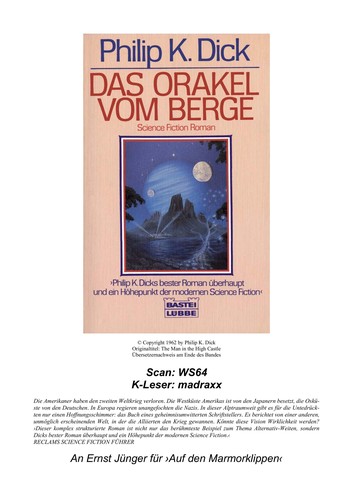Great premise, terrible execution.
1 star
Great premise, terrible execution.
Science-fiction-Roman Bastei-Lu bbe-Taschenbuch -- Bd. 24117 : Science-fiction-Special

285 pages
German language
Published Nov. 13, 1989 by Bastei Lübbe.
The Man in the High Castle is an alternate history novel by American writer Philip K. Dick. Published and set in 1962, the novel takes place fifteen years after an alternative ending to World War II, and concerns intrigues between the victorious Axis Powers—primarily, Imperial Japan and Nazi Germany—as they rule over the former United States, as well as daily life under the resulting totalitarian rule. The Man in the High Castle won the Hugo Award for Best Novel in 1963. Beginning in 2015, the book was adapted as a multi-season TV series, with Dick's daughter, Isa Dick Hackett, serving as one of the show's producers.
Reported inspirations include Ward Moore's alternate Civil War history, Bring the Jubilee (1953), various classic World War II histories, and the I Ching (referred to in the novel). The novel features a "novel within the novel" comprising an alternate history within this alternate …
The Man in the High Castle is an alternate history novel by American writer Philip K. Dick. Published and set in 1962, the novel takes place fifteen years after an alternative ending to World War II, and concerns intrigues between the victorious Axis Powers—primarily, Imperial Japan and Nazi Germany—as they rule over the former United States, as well as daily life under the resulting totalitarian rule. The Man in the High Castle won the Hugo Award for Best Novel in 1963. Beginning in 2015, the book was adapted as a multi-season TV series, with Dick's daughter, Isa Dick Hackett, serving as one of the show's producers.
Reported inspirations include Ward Moore's alternate Civil War history, Bring the Jubilee (1953), various classic World War II histories, and the I Ching (referred to in the novel). The novel features a "novel within the novel" comprising an alternate history within this alternate history wherein the Allies defeat the Axis (though in a manner distinct from the actual historical outcome).
Great premise, terrible execution.
I love this book; this and Ubik are my favorite PKD books, and I'm nearly a completist.
Dick takes an idea which is becoming commonplace - multiple universes - but pioneers it and give it his own unique spin. Essentially, the people in the book are living a post WWII tragedy, where the bad guys won - and to them, our universe is the good one, they'd much rather be in. From this premise PKD weaves in multiple characters and storylines from when he was essentially at the top of his game. Excellent book.
I love this book; this and Ubik are my favorite PKD books, and I'm nearly a completist.
Dick takes an idea which is becoming commonplace - multiple universes - but pioneers it and give it his own unique spin. Essentially, the people in the book are living a post WWII tragedy, where the bad guys won - and to them, our universe is the good one, they'd much rather be in. From this premise PKD weaves in multiple characters and storylines from when he was essentially at the top of his game. Excellent book.